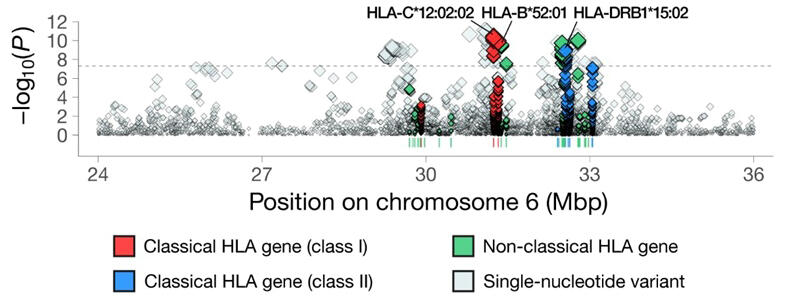A research group led by Assistant Professor Kyuto Sonehara (Invited Faculty Member, Osaka University Graduate School of Medicine) and Professor Yukinori Okada (Professor, Osaka University Graduate School of Medicine, Team Leader, RIKEN Center for Integrative Medical Sciences) of the Graduate School of Medicine at the University of Tokyo, and Clinical Assistant Professor Yoshitaka Yano and Professor Mayumi Sugiura of Nagoya City University Graduate School of Medical Sciences conducted a genome-wide association study in recurrent pregnancy loss (RPL) cases without clinically identifiable causes. The research group found that genetic polymorphisms of the human leukocyte antigen (HLA) gene in the major histocompatibility complex (MHC) region are involved in the etiology of RPL. Genome-wide copy-number variation (CNV) calling also showed the involvement of the gene encoding cadherin 11 (CDH11), a cell adhesion molecule, in the etiology of the disease. The work was published in Nature Communications.

Provided by the University of Tokyo
RPL is defined as the "occurrence of two or more miscarriages or stillbirths," and 5% of couples hoping to conceive are affected by RPL in Japan. The major known causes include antiphospholipid syndrome, uterine anatomic anomalies, and parental chromosomal translocations; however, these causes can be identified in about half of all cases, and the remaining half have no identifiable cause. The lack of etiological explanations not only poses a barrier to treatment but also causes psychological distress to affected couples. Elucidation of the mechanisms underlying RPL is an important issue in reproductive medicine. However, many previous studies had small numbers of study participants (fewer than 200) and used different definitions of affected persons, resulting in inconsistent results.
The research group conducted a genome-wide association study using genome data obtained from 1,728 female patients with unexplained RPL who were visiting the Nagoya City University Hospital and genome data from 24,315 control women available in the Biobank Japan project. They identified a gene polymorphism (rs9263738) associated with RPL in the MHC region. Furthermore, a detailed analysis of disease-susceptibility genes within the MHC region (fine mapping) revealed that a long-range HLA haplotype within the MHC region, which consists of multiple HLA alleles, has a protective effect on RPL. Based on the same genomic data, the research group also conducted genome-wide CNV calling. In particular, the analysis focused on CNVs causing loss of gene function and found that CNVs causing loss of function of the gene encoding cadherin 11 (CDH11), a cell adhesion molecule, are frequently found in RPL patients.
In this study, the HLA gene was implicated in the etiology of RPL through the analysis at a scale unparalleled in previous genetic studies on RPL. The importance of HLA molecules, which play a central role in discriminating self from non-self, in the mechanism of pregnancy maintenance has been discussed previously because pregnancy is an immunologically unique state in which two distinct individuals, i.e., mother and fetus, coexist. In this study, the importance of HLA molecules in pregnancy maintenance was demonstrated through the large-scale human genome analysis.
The findings provide a rationale for the importance of reproductive immunology in the pathophysiology of RPL and are expected to substantially advance its understanding. Moreover, CDH11 identified through the CNV analysis is a molecule that plays a role in anchoring trophoblast to endometrium. The results are expected to advance our understanding of the pathophysiology of unexplained RPL.
Journal Information
Publication: Nature Communications
Title: Common and rare genetic variants predisposing females to unexplained recurrent pregnancy loss
DOI: 10.1038/s41467-024-49993-5
This article has been translated by JST with permission from The Science News Ltd. (https://sci-news.co.jp/). Unauthorized reproduction of the article and photographs is prohibited.




